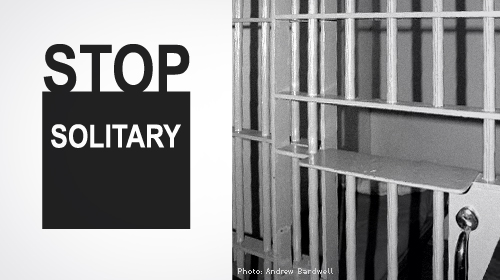Falling Behind: The Human Rights Implications of Solitary Confinement in the United States


Last week, the world celebrated International Human Rights Day, marking the 64th anniversary of the Universal Declaration of Human Rights. The U.S. was a leader in developing the declaration, but has fallen behind in translating it into domestic laws and policies. This is especially true in the areas of racial discrimination, criminal justice, and economic justice.
For example, when it comes to the punishment of criminals and the treatment of persons deprived of their liberty, the U.S. is an outlier, continuing to use practices that have become increasingly rare as the world moves towards compliance with human-rights norms. Last Monday, the ACLU highlighted some of these criminal justice-related violations in a submission to the U.N. Human Rights Committee, which next year will examine a United States compliance report under the International Covenant on Civil and Political Rights (ICCPR), a key human rights treaty the United States ratified in 1992.
The first of these violations is the practice of solitary confinement--the physical and social isolation of a prisoner for 22 to 24 hours per day. This isolation is sometimes accompanied by exacerbating circumstances, such as being held in a tiny room with little or no natural light. Some prisoners in solitary are denied reading materials or any other way to occupy themselves. As our submission to the Human Rights Committee explained,
A substantial body of research has demonstrated the harmful, and sometimes devastating, effects of solitary confinement on physical and mental health. These harmful effects are most starkly illustrated by the significantly higher rates of suicide among prisoners in solitary confinement than among those in the general prison population. Some groups, such as children and persons with mental illness, are particularly vulnerable.
Solitary confinement is not reserved only for the worst of the worst. In some cases, prisoners who allege sexual abuse are automatically isolated, as are prisoners with medical problems. As our submission pointed out, even children are isolated. As one woman who spent time in solitary confinement as a child in Michigan explained in a joint ACLU and Human Rights Watch report,
[I felt] doomed, like I was being banished ... like you have the plague or that you are the worst thing on earth. Like you are set apart [from] everything else. I guess [I wanted to] feel like I was part of the human race—not like some animal.
One man who was isolated as a child in Florida expressed similar sentiments:
The only thing left to do is go crazy—just sit and talk to the walls.... I catch myself [talking to the walls] every now and again. It’s starting to become a habit because I have nothing else to do. I can’t read a book. I work out and try to make the best of it. But there is no best…I feel like I am alone, like no one cares about me—sometimes I feel like, why am I even living?
It’s not surprising, then, that in 2011 U.N. expert Juan Mendez issued a report finding that prolonged solitary confinement constitutes a form of cruel, inhuman or degrading treatment, and in some cases can even amount to torture. Researchers estimate that 80,000 or more prisoners are held in forms of housing that involve substantial physical and social isolation in the United States. In “supermax” security detention facilities, solitary confinement can last for decades.
The ACLU’s submission to the Human Rights Committee raises the issue of solitary confinement along with several others. The committee will complete its review and issue recommendations for improved U.S. human rights performance next October. In the meantime, the Obama administration should take action to bring the U.S. in line with human rights norms and with its ICCPR obligations.
Solitary confinement should be heavily restricted and its prolonged use should be banned, as should solitary confinement of children and persons with mental illnesses. In order to facilitate review of the U.S. human rights record, the federal and state governments should make public information about the use and costs of solitary confinement. Such measures would be significant contributions to the important and ongoing process of bringing human rights home.
Learn more about solitary confinement: Sign up for breaking news alerts, follow us on Twitter, and like us on Facebook.

